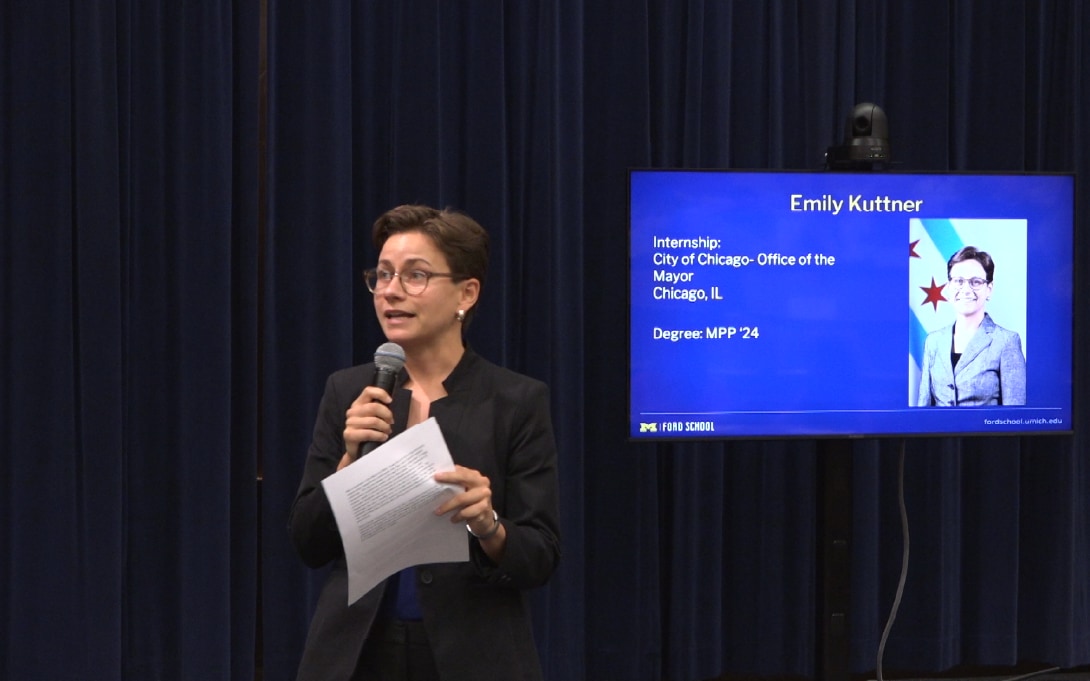
Eleven talented students showcased what they learned during their summer internship at the Ford School 7th Annual Policy Pitch Competition. Undergraduate and graduate students spent three minutes sharing their key deliverables, policy impacts, and lessons learned with the chance to compete for 1st, 2nd, and 3rd student prizes.
The panel of judges awarded students based on the clarity and effectiveness of the presentation, the potential policy impact of their work, and how it influenced the student’s long-term goals. Judges included: Yousef Rabhi, Washtenaw County Commissioner, Rohan Dharan (BA’13), Manager of Secondary Advanced and Enriched Instruction at District of Columbia Public Schools, and Latesha Love-Grayer (MPP’02), Director of International Affairs and Trade at US Government Accountability Office.
Emily Kuttner (MPP ‘25) – City of Chicago Mayor’s Office
What does the term “the full force of government” mean for you?
This summer I spent time as a mayoral fellow in the city of Chicago, and one of the projects I was involved in was supporting the chief homelessness officer with the creation of an interagency task force to address homelessness through cross-departmental collaboration and improving internal processes.
In the last year Chicago's unhoused population has increased by 20,000 people. That number primarily reflects the buses of new arrivals from Texas, but it also signals the increasing cost of housing in the city. As Chicago faces the end of the American Rescue Plan Act dollars and a 1 billion dollars budget gap, the city is wrestling with how to best address the large complex problem that is homelessness.
The full force of government was a tagline that was used in mayor speeches and around the office a lot this summer. The chief homelessness officer incorporated it into her work, saying “The city is addressing homelessness with an interagency task force that brings the full force of government to the table.”
Having heard this phrase repeatedly, I wondered, what does the full force of government actually mean?
So the interagency task force I worked on was designed for departments to problem solve and streamline processes by sharing data, information and strategies. My big contribution to the launch of the task force was a master tracker with tabs of everything, from the meetings with the senior leadership to the department’s engagement levels and representatives' contact information.
I learned that behind the scenes, operationalizing the full force of government requires the minutiae of lookup formulas and conditional formatting to get buy-in and to communicate this mayoral initiative to the mayor's cabinet and advisors. I wrote informational memos, created decks and drafted announcement emails.
Here I learned that operationalizing the full force of government requires building in time before an initiative is announced to be deliberative and iterative to get everyone on board.
After a summer in the mayor’s office, I’d say the full force of government means: Every department understands their work's impact, how their work impacts resident outcomes.
The tagline speaks to the need for cross-departmental collaboration in a large bureaucratic ecosystem that often celebrates siloed work. The Department of Aviation needs to be part of housing conversations because some unhoused residents are using the airports as informal temporary shelter. The Department of Transportation needs to be part of housing conversations, because coordinating the city’s landing zones for buses from Texas requires them to be at the table, and the Chicago public libraries needs to be part of housing conversations because their staff are now supporting new arrivals with printing and completing immigration documents.
The summer regrounded me in my “why local government is in the business of caretaking.” Our tools may be Excel and Powerpoint, but we carefully go through the process of drafting plans and making drafts so that the government can show up to meet the needs of residents.
It is through the work of local government that I can love and take care of the places and people that have loved me back. Thank you.
Read the other pitches:
Georgina Bailey – Lansing Board of Water & Light
Bridget Corwin – Great Lakes Renewable Energy Association
Audrey Dombro – City of Philadelphia, Office of Transportation and Infrastructure Systems
Nia Knox – UM Poverty Solutions
Emily Kuttner – City of Chicago, Mayor's Office
Alexie Milukhin – The Institute for College Access and Success (TICAS)
Samuel Owusu – U.S. House of Representatives, Committee on Education & the Workforce
Aiswarya Padmanabhan – Trust for Social Achievement
Katrina Wheelan – City of Detroit, Office of Budget
